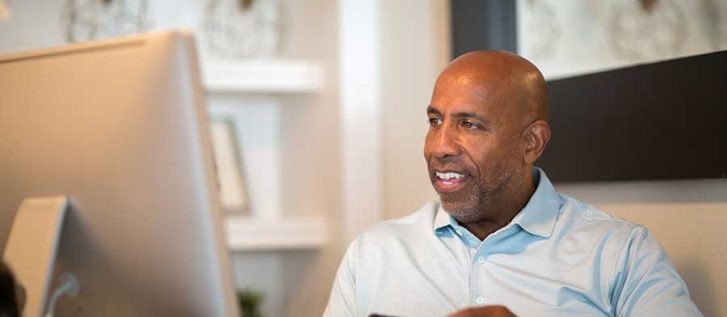
Why you may be eligible for Carer’s Allowance
There has been a lot in the news about problems with Carer's Allowance and people earning...read more
Rob Baker talks to workingwise.co.uk about job crafting, why it matters, what Covid might mean for greater flexibility and personalisation and why he is optimistic about the future.

Rob Baker is founder of the Tailored Thinking consultancy which aims to change employers’ mindsets so that they and their employees can achieve their full potential. He favours job crafting and sees the traditional approach to job design as being about slotting people into pre-ordained roles which he says is outdated and doesn’t embrace the diversity of their experience. He spoke to workingwise.co.uk about his work.
Workingwise.co.uk: What is job crafting?
Rob Baker: I came across job crafting when I was exploring how to help people fulfil their potential and personalise their work. Job crafting is about the small changes you can make to your job in order to continue to make the most of your strengths. You are not fundamentally changing the job, but how you think about the job.
Ww: Why does it make business sense?
RB: It allows organisations to tap into the innate talent and creativity that often lie dormant within them. Many have a top-down structure and expect individuals to execute decisions that are taken by managers. That may have worked in the past, but it is not as effective now in terms of allowing people to be agile, fulfilled and creative. When people are able to craft or personalise their job there are a number of benefits. It provides them with an opportunity to develop the role; studies show that they perform better if there is a closer fit between them and the role; that leads to greater customer satisfaction and greater well being for the individual. They have a greater sense of control. Lack of control is one of the key causes of stress at work.
Ww: How does job crafting affect well being?
RB: At the heart of well being is making people feel good and enabling them to function well. That increases their happiness and energy levels. They perform better.
Ww: How do you convince sceptics?
RB: There are lots of different types of scepticism about job crafting. Good leaders need to ask themselves questions, however. Do they believe they can trust their employees and that they are critical to the success of the organisation or do they believe the best approach is a command and control one. If the latter there is not much you can do to persuade them. The facts do not always change people’s fundamental beliefs. If, however, they are curious about getting the best out of their people then I can start to overcome their scepticism.
One of the biggest issues is that people think job crafting means ripping up job descriptions and anarchy in the workplace. Research and my experience show the opposite. When people are given the opportunity to craft their job they tend to do so in small ways. This can be backed up with information about crafting responsibly, getting individuals to think through or experiment with regard to the impact of changes on their colleagues or the organisation. It’s a good idea to test things out and collect evidence and then decide on how to proceed. Leaders think they are turning on a tap, but they can turn it just a little and see what happens.
Ww: Are you optimistic about job crafting in a post-Covid world?
RB: Job crafting is one element of baking in agile working from the bottom up. It’s about continual improvement and bringing that mindset of questioning how things are done. I am optimistic that more progressive, human-based approaches will prevail because a command and control approach is narrow, does not allow creativity or new ideas and tends to come with a high staff turnover. It may suit some industries in the short term, but it is not sustainable for those businesses who want to grow and innovate.
Ww: Do line managers need to be trained for job crafting?
RB: It is useful for line managers to understand different ways of getting the best out of people. It’s not about control but about enabling people. It’s useful for managers to have a framework for having conversations about job crafting and about what questions to ask people about personalising their jobs. They need to listen to what their team members say and enable them to be as successful as possible.
Ww: Does HR need to change?
RB: HR fundamentally needs to change and employers need to change how they see HR. If a business wants to be more people-led HR needs to move away from doing policy. It needs to shift its mindset and focus on being a force for enablement. There is now more recognition that jobs can be done differently. HR is just catching up with this. For instance, job descriptions do not always get to the DNA of the job and can be limited.
Ww: Is senior buy-in necessary?
RB: We need a top down and bottom up approach with senior leadership buy-in. The work culture needs to be right. If senior leaders are sceptical about personalisation they will probably find ways to inhibit it. That can be worse than not doing it at all.
Ww: What about candidates – do they need educating on job crafting?
RB: The hiring process should be presented as an opportunity to help the employer fulfill its purpose, being less about the mechanics of doing the job than its purpose. There should be space in the application process for applicants to say what element of the job they are passionate about and could develop further rather than them talking about how they will fit into a job which is already completely designed. There needs to be space for their personality and ideas. That enables managers to build in flexibility by design rather than having fully formed jobs which are more difficult to make more flexible. Job descriptions are just a snapshot in time. The process foregrounds what contribution individuals can make. In interviews now we often don’t ask about the things that matter.
Ww: Will the Covid recession have an impact on job crafting?
RB: Covid will mean there is an oversupply of talent for many roles. That may mean companies think they don’t have to innovate. They may get lazy and not implement any radical changes. However, I am optimistic that people will work in different ways as a result of Covid. I am hoping that it will create opportunities to work in different locations, doing different hours, and will see organisations being more open-minded about well being.
Ww: What feedback have you got from your book, Personalization at work, published earlier this year?
RB: I wrote the book for HR leaders, but I also made it accessible to individuals. I’ve been delighted by the feedback. People have said it has given them the confidence and courage to be more experimental about agile working. We spend so many hours a week at work. Life is too short to do it in a way that does not bring us joy or engage us. We need to think positively about the parts of that puzzle that need to change.

workingwise.co.uk outlines your rights when it comes to negotiating flexible working. read more

Simon Thomas from Ridgefield Consulting on how to claim tax relief as an employee when working from home. read more

So you want to work flexibly? Find out what the allowable reasons for flexible working are under a formal flexible working request. read more

Flexible working gives employees the choice of when and where they work. It can be incredibly beneficial for both employer and employee, in terms of... read more